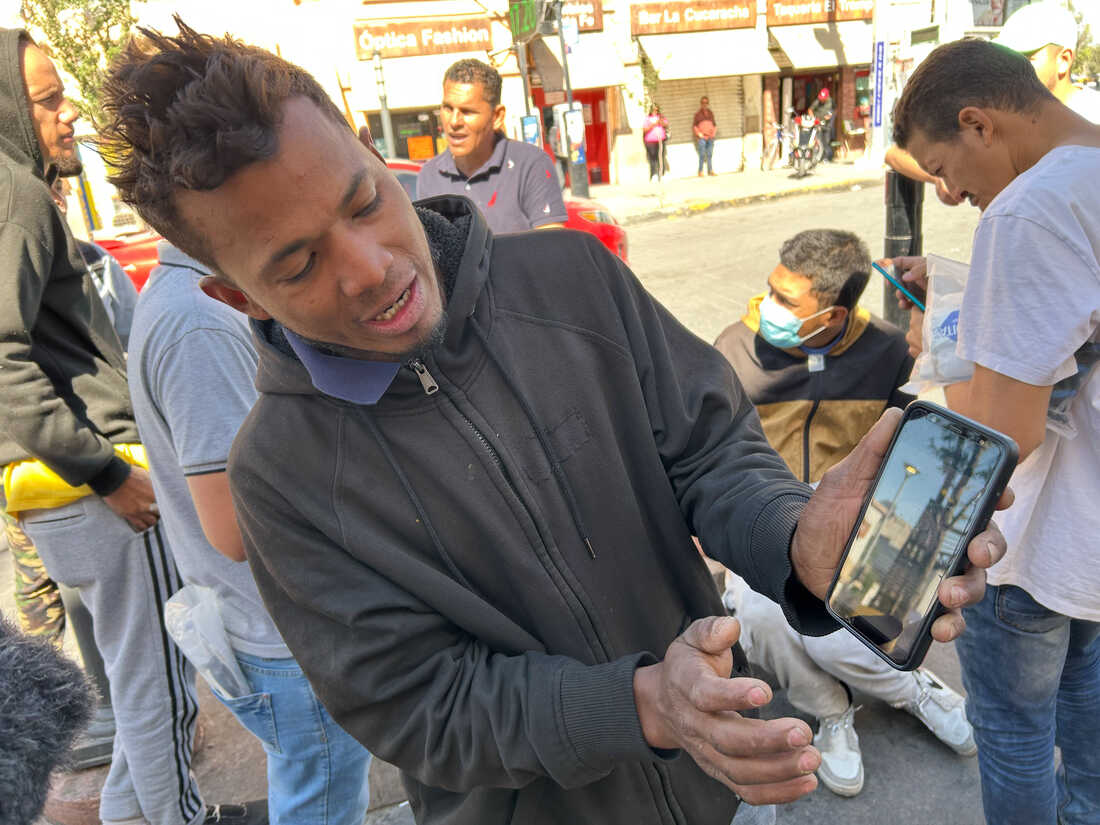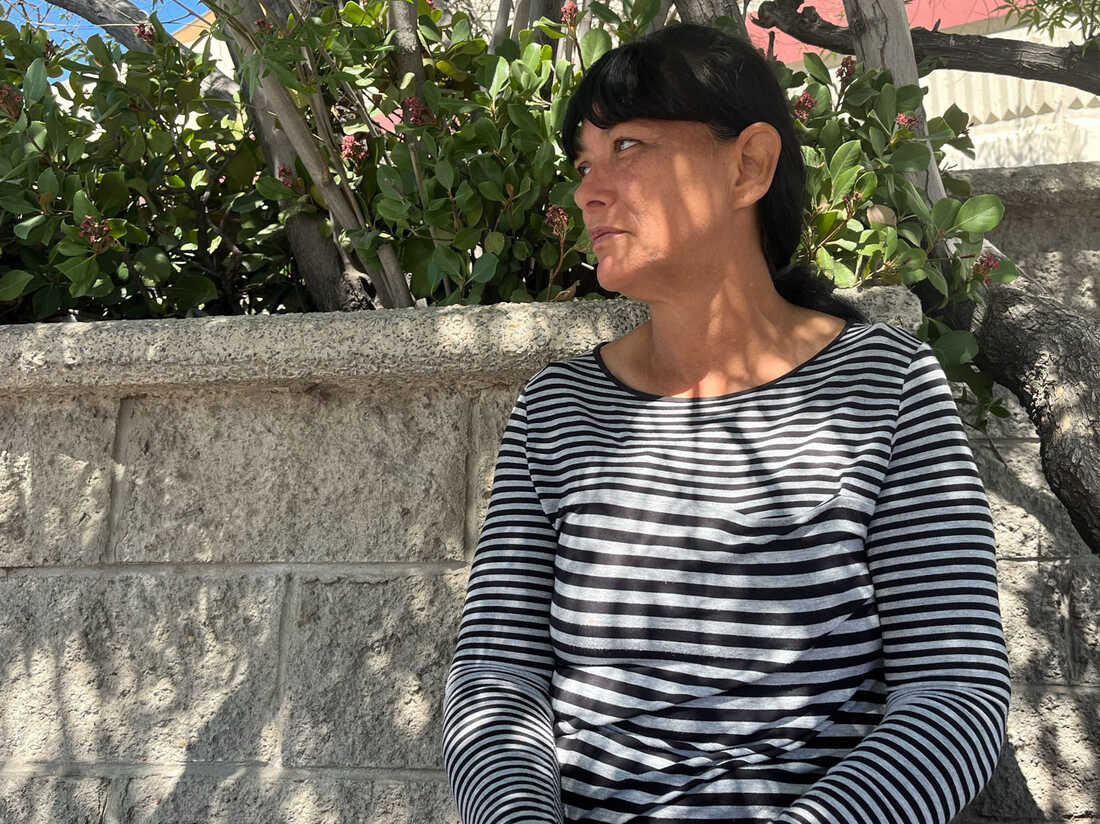Migrants are frustrated with the CBP One app — even after the latest overhaul : NPR

A group of Venezuelan men, including Luis Suárez and Carlos Carrillo Zambrano (pictured in the foreground), at the Paso del Norte International Bridge in Ciudad Juárez, Mexico. They are among the many migrants who say the CBP One app is still riddled with glitches despite a recent update.
Joel Rose/NPR
Hide caption
toggle caption
Joel Rose/NPR

A group of Venezuelan men, including Luis Suárez and Carlos Carrillo Zambrano (pictured in the foreground), at the Paso del Norte International Bridge in Ciudad Juárez, Mexico. They are among the many migrants who say the CBP One app is still riddled with glitches despite a recent update.
Joel Rose/NPR
Ciudad Juárez, MEXICO — At the base of the Paso del Norte international bridge, half a dozen young men huddle over their phones. You’re trying to register for a coveted job interview appointment at the US port of entry just across the bridge in El Paso, Texas.
One after the other looks up in disappointment, the familiar message appears on their screens: “System error”.
“If you log in, the app kicks you out,” said Luis Suárez, a 37-year-old from Venezuela, while holding up his phone. “The app opens at 9 a.m. and at 9:01 a.m. you can’t register.”
For migrants like Suárez, the CBP One app is now the main authorized portal to apply for asylum at the US-Mexico border. In response to widespread complaints, US immigration officials announced a major overhaul of the app, which went into effect last week.
But migrants in Ciudad Juárez say the app still doesn’t work for them. NPR observed several people making repeated unsuccessful attempts to log into the app on Thursday.

Luis Suárez, a 37-year-old from Venezuela, has been repeatedly banned from the CBP One app days after officials announced major improvements. He hasn’t been able to make an appointment on the platform for about six months, he said.
Joel Rose/NPR
Hide caption
toggle caption
Joel Rose/NPR

Luis Suárez, a 37-year-old from Venezuela, has been repeatedly banned from the CBP One app days after officials announced major improvements. He hasn’t been able to make an appointment on the platform for about six months, he said.
Joel Rose/NPR
Back to square one after months of waiting
“It’s a waste of time,” Suárez said in a frustrated voice, “even now that it’s been updated.”
“It’s just on the logo,” he said in Spanish. “It sends you back to the beginning and if you try again, the appointments are gone. You have to wait until the next day.”
Suárez knows that from experience. Since arriving in Juárez six months ago, he’s been trying to get an appointment through the app, to no avail.
Suárez is tired of waiting for the app to work, he said. So he crossed the border and turned himself in to border police this week. He was held for four days and was sent back to Mexico on Thursday. His eyes are bloodshot from exhaustion. But he’s not giving up, he said – he wants to go to the US to find a job that will allow him to support his wife and two children in Venezuela.
CBP says it is working on ‘minor issues’
Immigration authorities have attempted to make improvements to the CBP One app. They have increased the number of appointments available across borders from 750 to around 1,000 per day. These appointments are now available throughout the day instead of just at a specific time.
“We believe the changes worked well,” said Blas Nuñez-Neto, the assistant minister for border and immigration policy at the Department of Homeland Security, during a call with reporters on Friday.
“We fully know that there is a strong demand for the thousand slots that will be available every day. Therefore, individuals may have to wait,” Nuñez-Neto said.
He added, “As with any new adoption of a process or new technology, we anticipate that there may be minor issues along the way and we have addressed these as soon as they were brought to our attention.”
Immigration officials said they changed the CBP One scheduling system to give priority to migrants who have waited the longest for an appointment.
But that’s not what migrants in Juárez say they’re experiencing.
Weighing up whether to cross illegally – again
Carlos Carrillo Zambrano said he has been trying unsuccessfully to get an appointment through the app since January. Carrillo, 23, is originally from the Venezuelan state of Carabobo.
“We live with rumors from the news, Instagram and TikTok,” he said in Spanish, “that the border will open and Venezuelans will be let in – that we will be welcome.” But these are lies. Even those who make it are often deported.”
Carrillo was also increasingly frustrated with the CBP One app and joined the group of migrants who turned themselves in to border police this week. They were returned to Juárez under Title 42, the pandemic border restrictions that expired late Thursday night.
Now that Title 42 has expired, they are afraid to try crossing the border again, fearing they could face lengthy imprisonment. Persons crossing the border illegally could face a five-year ban on re-entering the United States due to current border policies.
For now, they say they’ll keep trying the CBP One app.

Denise Hernández, an asylum seeker from Maracaibo, Venezuela, said her and her husband’s shared phone was stolen while traveling to the border after being deported from the US. Without one, they would not have access to the CBP One app.
Marisa Peñaloza/NPR
Hide caption
toggle caption
Marisa Peñaloza/NPR

Denise Hernández, an asylum seeker from Maracaibo, Venezuela, said her and her husband’s shared phone was stolen while traveling to the border after being deported from the US. Without one, they would not have access to the CBP One app.
Marisa Peñaloza/NPR
Scrape together money for a phone, even though it’s the key to the asylum
For Denise Hernández, another asylum seeker from Maracaibo, Venezuela, that’s not an option.
She said earlier this week she and her husband also turned themselves in to border police and were expelled. He was taken back to Juárez, but she was sent to Piedras Negras, which is almost 500 miles away.
Hernández said she rode the train in Mexico to see her husband in Juárez but was robbed on the way. The thieves took everything, she said, including the only cell phone the couple owned.
“We’ll have to wait until we get another phone and try through the app,” she said in Spanish. “Otherwise we will be sent back. I’m afraid,” she whispered.
Hernández, 52, says she was a political activist in Venezuela and can’t go back. Her 22-year-old daughter and five-year-old grandson have made it to the US and she hopes to join them. But her son-in-law was also deported and she doesn’t know where he is.
“It’s a lot of toughness,” Hernández said, “but I don’t blame anyone, we made our own decisions.”
Hernandez looks off into the distance, perhaps wondering if they made the right choice.
“I never thought [the journey] “It would be so difficult,” she lamented. “It was a lot, and now my family is separated.”
Hernández and her husband hope to earn enough money to buy a new phone so they can try the CBP One app again. For now, they’re sleeping in a tent on the street near the Paso del Norte bridge while the El Paso skyline can be clearly seen across the Rio Grande.